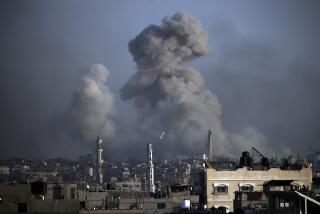U.S. Has ‘Closing Window’ to Stabilize Iraq, Advisors’ Report Says
- Share via
WASHINGTON — A team of civilian advisors tapped by the Pentagon to examine the postwar situation in Iraq said Thursday that the United States has a “closing window” in which to bring stability to the country or risk having the broader population turn against the U.S.-led occupation.
The advisors, who traveled to Iraq at the request of Defense Secretary Donald H. Rumsfeld, said deteriorating security, a growing sense of disenfranchisement among Iraqis, and their pervasive fear that deposed President Saddam Hussein will return are undermining U.S. efforts.
“We do feel we are in a closing-window situation,” probably less than a year, said Fredrick Barton, a senior advisor at the Center for Strategic and International Studies, a Washington- based think tank that organized the Iraqi study.
Barton, a former U.N. official, was part of a five-member team of reconstruction experts that spent 11 days in Iraq this month. The team discussed its findings at a news conference in Washington on Thursday.
The report identified a series of recommendations, including a significant expansion of patrols on Iraqi streets, the establishment of Iraqi-run councils to manage local affairs in districts outside Baghdad, and work programs to pump money into the economy and “keep Iraqis from being idle.”
The most serious problem identified in their report is a “general sense of steady deterioration in the security situation in Baghdad, Mosul and elsewhere.”
Beyond the spate of attacks on U.S. and British troops since major combat ended May 1, aid workers and other nonmilitary officials have also had their vehicles fired upon in recent weeks and have had stones thrown at them at reconstruction sites.
Although the coalition military presence is large, with about 150,000 troops in the country, “it is not visible enough at the street level ... nor is it sufficiently agile,” the report said.
Barton said U.S. forces have conducted effective sweeps through swaths of hostile territory to confiscate weapons and root out insurgent groups.
But “there was not a feeling in the city of ... the cop on the beat,” Barton said. The occasional Humvee seen rolling by, Barton said, “looked almost more a target than a source of comfort.”
Much of the U.S. military’s resources are tied up guarding American compounds and other large facilities, rather than patrolling the cities and enforcing law and order, Barton said. Even aid teams and reconstruction crews are being forced to devote large chunks of their budgets to hiring security details.
Sending more U.S. troops to the country might have been helpful right after the war, but could inflame the situation now, the report said. It said the United States should step up military patrols, seek commitments of forces from other nations, and hire private contractors to guard low-risk installations.
The security problems are compounded by pervasive fears among Iraqis that Hussein could return to power. From hundreds of interviews with Iraqis, the team concluded that most Iraqis are happy Hussein has been overthrown, but they have been cowed by strikes on locals cooperating with the coalition.
“Iraqis do want a new government; they don’t want to go back,” said report coauthor Robert C. Orr, a former White House official and now Washington director of the Council on Foreign Relations. “The bigger issue is unfreezing the larger Iraqi population that would really like to create a new country but are too scared to.”
The report expressed particular concern that the United States has failed to make better progress restoring basic power, water and oil services, calling these aspects of the infrastructure the “iron triangle.”
The authors said the United States should be moving more quickly to bring in generators and other supplies to fix infrastructure problems, and has been too slow to give up on the idea of mending existing systems now damaged beyond repair.
“It would be hard to have too many generators in Iraq,” Barton said. “If there are stockpiles of them in U.S. warehouses, it would be wise to liberate them.”
The group offered some novel suggestions, including using revenue from future oil sales to create bank accounts for ordinary Iraqis to encourage them to use the banking system. The team also suggested setting up a new TV broadcast to communicate the American message.
The panel noted that the postwar situation in Iraq is unlike other reconstruction efforts in that it is being run almost entirely by the Pentagon, but the group stopped short of criticizing this arrangement or blaming the military for the problems cited in the report.
“However we got here, U.S. prestige and credibility is on the line,” Orr said. “This is one the U.S. has to get right.”
Pentagon spokesman Bryan Whitman said that the Pentagon had already begun pursuing some measures proposed in the report.
More to Read
Sign up for Essential California
The most important California stories and recommendations in your inbox every morning.
You may occasionally receive promotional content from the Los Angeles Times.













